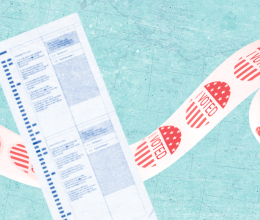FACTS:
During the 2022 lame duck session, the Ohio legislature passed H.B. 458. A “death by 1,000 cuts” voter restriction bill that went into effect on April 7, 2023. Its major provisions are:
- A requirement that an elector present government-issued photo ID to vote in person, unless the elector has a religious objection to being photographed. The acceptable forms of ID are an unexpired Ohio driver’s license or state ID card, U.S. passport or military ID.
- Shortening the deadline – by 4 days - to submit an application for an absentee ballot. Now a ballot must be applied for by the close of business 7 days before Election Day.
- Shortening the deadline for the Board of Elections to receive an absentee ballot by 6 days. Now the ballot must be received by the fourth day after Election Day.
- Restricting the Board of Elections during the absentee voting period to providing not more than one drop box, which must be located on the premises of the Board.
- Criminalizing the returning of an absent voter’s ballot by persons other than certain listed relatives or agents of the USPS or private mail carriers.
- Elimination of in-person absentee voting on the Monday before Election Day, and reallocation of those hours to earlier in the absentee voting period.
- Apparently imposing a limit on the types of disabilities that a voter must have in order to be permitted to vote curbside.
- The cumulative impact of many of the restrictions – including the cutbacks to early voting, the new photo ID requirements, and the limitations on the use of drop boxes and curbside voting – will have an especially negative affect on voters with disabilities.
Egregiously, H.B. 458 makes it a felony for anyone other than a mail carrier, election worker, or statutorily enumerated family member to “possess” or “return” the absentee ballot of a voter with a disability. Nursing home aides, domestic partners, adult grandchildren, cousins, neighbors, roommates, and friends are all now barred from assisting disabled Ohioans in returning their absentee ballots.
Many disabled voters do not even have living family members who meet the criteria on the list, others live far from or otherwise are unable to receive voting assistance from these family members. Meanwhile, the very people who already live with and/or provide care for these voters are precluded from helping. This creates an extreme burden on some voters, and makes voting an outright impossibility for others.
LEGAL THEORY:
The burdens placed on voters with disabilities by H.B. 458 violates Title II of the Americans with Disabilities Act, Section 504 of the Rehabilitation Act of 1973, Section 208 of the Voting Rights Act of 1965, the Supremacy Clause of the U.S. Constitution, the Due Process Clauses of the Fifth and Fourteenth Amendments, and 42 U.S.C. §1983.
STATUS:
We filed the complaint in U.S. District Court for the Northern District of Ohio on December 19, 2023 againse Secretary of State Frank LaRose, Attorney General Dave Yost, and Cuyahoga County Prosecutor Michael O'Malley. The presiding judge is Judge Bridget Meehan Brennan. The state defendants filed their Answer on January 19, 2024. Prosecutor O'Malley filed his Answer on January 25. Also on January 19, the Ohio Republican Party and Republican National Committee filed a Motion to Intervene as defendants. No party opposed the motion and permissive intervention was granted on February 6, 2024. A case management conference was held on February 29.
The Court entered an expedited case schedule on March 1 and protective order on March 7. Defendants moved to file an amended answer on March 15. Their motion was granted on April 3, and they filed their amended answer on April 5. The Parties exchanged motions for summary judgment on May 24. Several states and the District of Columbia filed an amicus brief in support of Plaintiffs. Parties filed responses on the Motions for Summary Judgment on June 14. On June 17, the United States of America filed a Statement of Interest supporting Plaintiffs’ interpretations of the Voting Rights Act and the Americans with Disabilities Act as they relate to our claims.
Summary judgment briefing concluded on June 21. On July 22, the Court issued a ruling in our favor, finding that the challenged statutes are preempted by the Voting Rights Act, and permanently enjoined the State from enforcement. The time for the Defendants and Intervenors to appeal has now passed, with no appeal having been filed.





